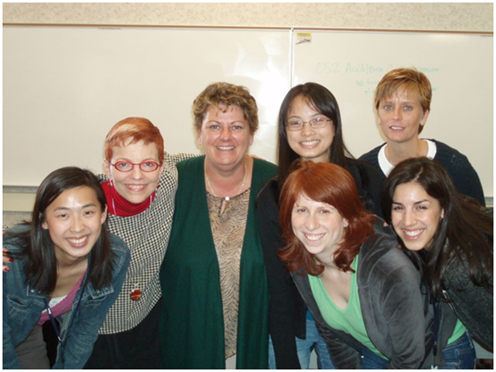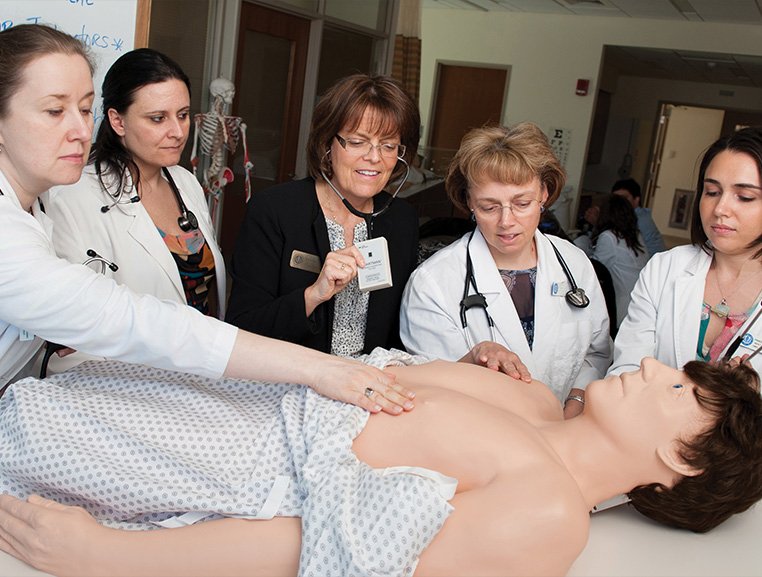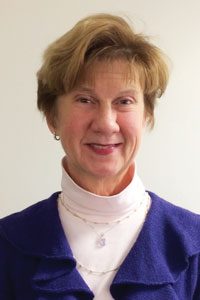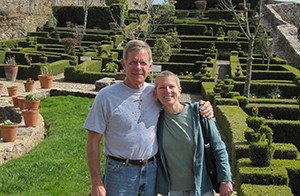Saving Lives in Haiti

Bette Gebrian ’77 (NUR), ’93 Ph.D. and Judy Lewis M.Phil., professor of community medicine and health care, have sustained a 30+-year partnership committed to improving basic health care in rural Haiti.
In 1982, when Bette Gebrian ’77 (NUR), ’93 Ph.D. made her first trip to Haiti, she already had earned her undergraduate degree in nursing at UConn and her master’s degree in public health at Johns Hopkins University. Still, she found she was unprepared for what she experienced there.
“I was devastated by how little I knew, how little I had to offer in terms of my knowledge of the language, the tropical diseases, and the lack of access to treatments, medicines, and basic care,” she says. “I knew that I needed to keep learning.”
Gebrian enrolled in a doctoral program at UConn to combine study in nursing, public health, and medical anthropology. She began studying the Kreyol language used in Haiti at Yale and in Boston. And she formulated a plan to return to Haiti to work alongside a public health nurse she had met during her time at Johns Hopkins.
Her plan was to complete her dissertation and stay a year at most in Jérémie, a city located in southwestern Haiti. She has been there ever since.
Gebrian married in Haiti, raised two daughters there, and has worked to improve health care services for more than 160,000 people. She has endured malaria and dengue fever, worked through local disasters like the aftermath of the earthquake that hit Haiti in 2010, a cholera outbreak, and Hurricane Matthew in 2016.
“Trust,” she says. “It’s all about trust. The goal is to build upon each success, each disaster, each friendship to establish a sustainable set of behaviors that save the lives of thousands of people through the training and support of local men and women.”
Community Collaboration is Key
Gebrian’s work in Haiti began with her doctoral thesis, which examined the ways in which public health workers can successfully embed themselves in a community and improve medical outcomes by encouraging community participation.
To explore this theme, she teamed up with Judy Lewis, UConn professor of community medicine and health care, who was well-versed in working abroad and committed to ensuring that health education programs and interventions were fully compatible with the cultural norms in each unique setting.
Lewis, who has worked in more than 50 countries over the course of her career, notes that strong relationship-building has made all the difference. “Most people in these communities are astute at judging the motivation and skills of those who come to help,” she says. “Because Bette is a member of the larger community, and I have been coming here for a long time, we are both familiar with the environment and the people. So, the programs we helped to build came together in a much more natural way.”
Oin threne of the most successful interventions to come out of their partnership was an effort to combat childhood bacterial pneumonia, a major cause of death in children in rural Haiti. Mothers often mischaracterized or misunderstood the symptoms their children exhibited, and care often came too late or not at all.
Gebrian and Lewis led the Haitian Health Foundation’s (HHF) participation in a World Health Organization assessment to understand mothers’ conceptions of their children’s illness.
“Before we went plowing into the intervention, we had a great opportunity to use several anthropological methods to find out how they categorized things related to child health,” says Gebrian. “The women would say the children ‘have worms’ or that ‘their ribs are dancing’. They gave it a certain name, but often didn’t see the seriousness of it at the outset.”
What they observed informed an HHF intervention that used anthropology, sociology, nursing and public health to create a program that addressed the leading cause of child death in the area through education, diagnosis, and treatment of children under the age of five.
A process was set in motion that included a one-page pictorial home-care set of instructions for caring for children with pneumonia; training for 25 rural village health workers in accurately assessing a child for the illness; the development of monitoring tools for health workers; a set of seminars and community meetings to spread knowledge about recognizing and treating pneumonia; and procedures for tracking all episodes of pneumonia in children through a computerized health information system.
Within three years, they had documented more than 17,000 episodes of acute respiratory infection in children and reduced the mortality rate for pneumonia from 6.2 per 1,000 per year to 3.1 per 1,000 per year. The HHF went on to use this approach to increase vaccination rates, encourage exclusive breastfeeding, and address diarrheal disease and congenital syphilis.
This approach is integral to the Grand’Anse Health and Development Association, where Gebrian currently serves as executive director. The organization is currently using a similar process to address breast cancer in the region.
Partners in Progress
Gebrian and Lewis’s partnership also paved the way for intensive collaboration with more than 40 UConn health professions students and residents who have traveled to Haiti since 1987. Over the years, these students helped lay the groundwork for effective interventions by researching community beliefs, mapping out prevalent barriers to health care access, and engaging community members in discussions about regular health maintenance.
“Without the student work, our services wouldn’t be as good,” says Gebrian. “It’s rare that a service provider in a third-world country like Haiti utilizes the research of students to improve health. It’s not just that they came to Haiti to add to their resumes. They did serious, program-related operations research that helped to guide new programs or to evaluate and improve the existing ones.”
Their contributions include clinical documentation, developing educational plans, strengthening prevention programs, and addressing more complex diseases. Christina Yang ’20 (MED), for example, spent her time in Haiti interviewing women about the cultural barriers to breast cancer care in the region. She is currently working on two papers informed by this research: one will discuss the barriers and other findings that might help improve future education and breast cancer screening programs in Haiti, and the second will discuss the religious influence on health care in rural Haitian communities.
“Summer of 2017 in Haiti was filled with cultural shocks and new perspectives,” she says. “It opened my eyes to see the challenges of medical work globally and helped me learn the importance of cultural understanding and education in disease prevention. This experience enhanced my medical education as a student and solidified my career goal in global health work as a pediatrician.”
Fellow UConn medical student Gabriel Paul created a research plan with Professor Lewis’s help and visited Haiti in 2018 to explore men’s knowledge about breast cancer and their willingness to support their female partners. Although he found low levels of awareness about different aspects of the disease, his research indicated that Haitian men were willing to stay with their wives throughout treatment, even after a mastectomy.
“From the first time I met with Professor Lewis, it was hard not to notice how passionate she is for her work, and her love for the Haitian people. When I initially reached out to her about potentially doing research in Haiti, she insisted that I first learn more about the history of Haiti and its culture,” says Paul. “It was also incredible to see the level of involvement Dr. Bette has in the community of Jérémie, and all of the fascinating work she has done and continues to do there. It was a truly life changing experience, and I am counting the days until I get the chance to return!”
Like Paul, many of the students who have worked with Lewis and Gebrian continue to return to Haiti in a volunteer capacity
Inspiring Others Throughout UConn Nation
In addition to the students who have aided Gebrian and Lewis, a group of dedicated UConn alumni have found their way to Jérémie to provide support.
Dr. Dan Scoppetta ’77 M.D., a surgeon, spent years volunteering in Dame Marie, a town on the Haitian coast west of Jérémie. His particular interest was in hernia repair, but everything changed when he visited the hospital in Jérémie and met a woman with end-stage breast cancer. The hospital had no surgical program and there was little they could do for her.
“It broke my heart,” he says. “I talked to the nurses about her wound care. Bette made sure she got to the Sisters of Charity, who provide hospice care. Breast cancer care in Haiti is challenging because early detection is not common, and the treatment options are limited.”
The Grand’Anse Health and Development Association’s breast cancer initiative hopes to address that. The program aims to increase community knowledge disease, trains nurses and doctors to do clinical breast exams, and offers biopsies that are analyzed in the United States. Gebrian asked Dr. Scoppetta to help develop a surgical program for breast cancer so women would not have the burden of traveling to Port-au-Prince. In 2016, Dr. Scoppetta conducted the first mastectomy performed in Jérémie, and he has since organized teams of surgeons, anesthesiologists, and support staff to come to the hospital. The teams work with local physicians and nurses to improve their skills.
“There’s great potential here,” Scoppetta says. “The hospital in Jérémie has the capacity to deliver excellent care.”
Looking Toward the Future
Gebrian and Lewis’s commitment to the people of Haiti and to the expansion of health care access in resource-poor locations in clear. Looking ahead, there is more work required to address breast cancer, including oncology services and broader community outreach. In addition, they would like to address sickle cell disease, mental health, better emergency response, and other unmet needs within the community. This all requires consistent work with Haitian health professionals and community members.
“We believe that everybody deserves first world medicine,” says Lewis. “But you can’t wait for first-world medicine when there are problems that need to be addressed immediately. You need to be able to work within the resources that are available and be as creative as possible.”
“My time in Haiti has taught me that it’s a process and it takes time,” says Scoppetta. “When I’m feeling low about how things are there, I think if there’s one person that I’m helping, that’s one more person in Haiti that gets helped.”
“Most of us couldn’t survive a Haitian life in the rural areas,” says Gebrian. “But they just keep going. So, we are learning from them. We teach them what we can, but we learn much more from them.”



